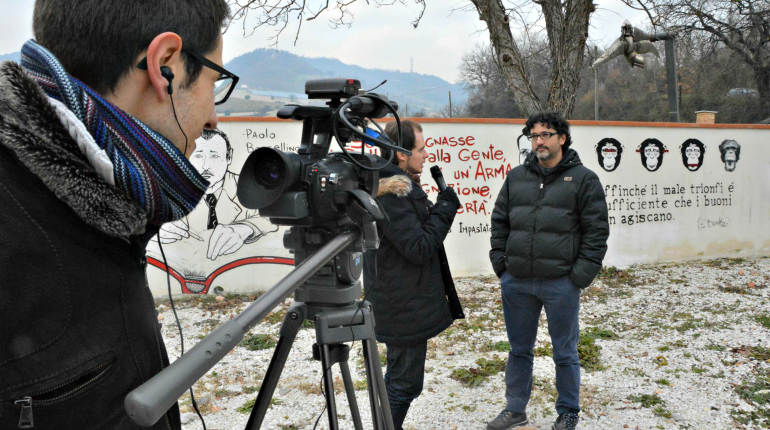
The cooperation between the Espresso Group and Confiscati Bene was born in September 2014, when 18 local newspapers published for the first time the map of seized assets in Italy, region by region. Still, the idea of creating a single place for gathering as many documents as possible on seized assets was born on March 2015 at the Spaghetti Open Data in Bologna (the annual meeting of Italian citizens interested in having data released in an open format). The project aims at combining the work done on the national database of seized assets with local stories concerning the assets, their management after the seizure, their reuse. In the following months, the research was extended to a European level, and L’Espresso published an international investigation on seized assets in the UK, in France and in Spain.
READ MORE: “Riprendiamoli”, the Challenge for Confiscated Goods
In December 2015 the students of the Institute of Journalism, Advanced School of the Carlo Bo University in Urbino, joined the project with a collaboration with the Espresso Group. The idea is realising an investigation on seized assets and the difficulty of giving back to citizens the holdings coming from illegal activities, as established by the Italian law, aspiring to create a virtuous training path allowing to “re-earn” the assets. With a 2-day workshop, data-journalists Andrea Nelson Mauro and Gianluca De Martino together with their young colleague built the project “Confiscati Bene Marche”, a team of 12 trainee journalists began an analysis of the existing reality. In the end, data was revealed: there were 58 seized assets in the Marche Region. The stories to tell are three instead. The first story develops in Cupramontana, in the Province of Ancona, where the ruined building seized from Enrico Nicoletti, treasurer of the Banda della Magliana [“The Mob of the Magliana neighbourhood”, an infamous gang of Rome], has become a centre for helping people affected by psychological pain. The second story to tell originates in Fano, in the Province of Pesaro-Urbino, where a flat seized from a local entrepreneur is to be dedicated to homeless people, while the third story is in Isola del Piano, some kilometres north from Fano, where a villa seized from a usurer of Erba has been turned into a “farm of legality.” The result is a series of multimedia stories published on “Ducato”, the website of the Institute of Journalism of Urbino.
READ MORE: “Riprendiamoli”, How Did Confiscati Bene Came to Be?
In April 2016, the cooperation between the students and the Espresso Group enters its second phase: seven students of the Institute are sent in the newsrooms of local newspapers (in Udine, Mantova, Modena, Reggio Emilia) and in the central newsroom in Rome for a 3-month internship in which they will keep up working on the project on seized assets. Thanks to the help given by Libera – the NGO committed to recovering seized assets – and by several social cooperatives in charge of their management, the stories now come from all over Italy, from the Wall Street Pizzeria in Lecco to the complaint filed by the association “A testa alta” in Licata, in the province of Agrigento. And the investigation takes on legs.
READ MORE: “Riprendiamoli”, Mafia Bosses’ Ferrari Cars
The interviews to Nando dalla Chiesa, Honorary President of Libera, and don Luigi Ciotti, founder of Libera, were crucial for understanding the role of the antimafia authority in the world of seized assets. The Senator of the Democratic Party and member of the Justice Committee, Giuseppe Lumia, has instead explained the main issues concerning the amendment laws to the 2011 Antimafia Code. Finally, Umberto Postiglione, Director of the National Agency of Seized Assets, talked about the difficulties concerning the management of these assets.
READ MORE: “Riprendiamoli”, Confiscated Goods: Your Alerts
Twenty-four persons worked at the investigation, which offers a picture of the current situation and of the critical aspects connected with the recovery of seized assets. Still, the investigation aims at being a starting point to involving all those – journalists or citizens, professionals or volunteers – who have the restitution of these assets illegally collected by crime close to their heart, in order to have them usable by their legitimate owners: citizens. Confiscati Bene is hence the reference point at national level for stories, complaints, open data: the community can already count on dozens of activists and is getting wider and wider, gathering information and allowing the database to become richer, highlighting cases of good and bad management. Joining usefulness and narration, service tools and the possibility of finding a solution of the issues concerned, thematic in-depth analysis and activism: this has always been the target of our project, synthesised by the title “Riprendiamoli” [“Let’s get them back”].
Institute of Journalism of Urbino
Pier Vittorio Buffa, Daniela Larocca, Jacopo Salvadori, Andrea Perini, Martina Nasso, Marco Tonelli, Enrico Forzinetti, Isabella Ciotti, Nicola Petricca, Giorgio Pinotti, Simona Desole, Vincenzo Guarcello and Dania Dibitonto
Espresso Group
Agl: Andrea Iannuzzi, Tecla Biancolatte, Marianna Bruschi, Silvio Falciatori, Rosa Maria Di Natale. Repubblica: Paola Cipriani. Gazzetta di Reggio: Enrico Lorenzo Tidona
Confiscatibene
Gianluca De Martino, Andrea Nelson Mauro, Alessio Cimarelli and Elena Iannone
Translated by Marion Sarah Tuggey